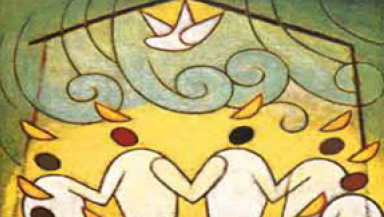Pentecost is one of the great festivals of the Church. In modern popular culture it isn't nearly as well known as Christmas or Easter, but for Christians it's profoundly significant. It marks the coming of the Holy Spirit on the disciples and their transformation from frightened and confused people to men who would face martyrdom for what they believed.
1. Pentecost means '50'.
Pentecost is from the Greek word 'Pentekostos', which means 'fifty'. It's the 50th day after the Sabbath of Passover week and in Judaism is called the Feast of Weeks (Leviticus 23:16).
2. It's traditionally celebrated as Whitsun.

The word Pentecost has become more common in the UK, but traditionally the Church celebrated it as Whitsun – 'White Sunday'. It's believed that this is because it was a day for baptisms and those being baptised would wear white. Another explanation is that it derives from the Anglo-Saxon word 'wit', which we still use for verbal cleverness but which meant 'understanding' – Pentecost was when God poured out the wisdom of the Spirit.
3. There's debate about speaking in tongues.
Luke tells the story in Acts 2:1-13. Some scholars think he was referring to an experience of 'glossalalia' or speaking in tongues, an ecstatic outpouring of praise in an unknown language. Others point out that what the disciples said seems to have been understood by their hearers.
4. Pentecost is the fulfilment of two promises.
One promise is in the Old Testament – Joel 2:28, which says "I will pour out my Spirit on all people", and one in the New, where Jesus says he will send another Counsellor, the Spirit of truth (John 16: 5-15).
5. Modern day Pentecostals emphasise the gifts of the Spirit.
Pentecostals are so called because of the emphasis they place on the gifts of the Spirit, particularly speaking in tongues. They stress the possibility of a direct personal experience of God, like the first disciples, which – just as it was then – is often manifested in dramatic ways. Modern Pentecostals trace their origins to the Azusa Street Revival in 1906 Los Angeles.
6. There was wind...
Luke tells of three distinct experiences. A violent wind filled the house: breath or wind is a symbol of the Spirit of God. Ezekiel 37 tells the story of the prophet's vision of a valley of dry bones which come together: when the 'breath' of God enters them, they come to life and stand on their feet. The Pentecost wind represents the power of God to bring life to the 'dry bones' of faith.
7. ...and tongues of fire...
Tongues of fire separate and come to rest on each of them. Jesus told his disciples, "You are the light of the world" (Matthew 5:14). In John 8:12 he says, "I am the light of the world." The picture in Acts seems to be of a single flame that separates and symbolically rests on each of them; the disciples will do what Jesus did.
8. ..and other languages.
The nature of the original experience has been queried, but in Luke's telling of it the point is that it breaks down barriers between people. The story links back to one of the earliest of the Old Testament stories, in Genesis 11, when the people begin to build the huge Tower of Babel. God confuses their language so they can no longer understand each other. At Pentecost, this Babel confusion is reversed.
9. Pentecost is the birthday of the Church.
It marks the beginning of Christianity as a purposeful movement and a new community. When Peter preached immediately afterwards, around 3,000 people believed and were baptised.
Follow @RevMarkWoods on Twitter.













